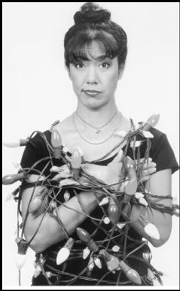SUGAR PLUM FAIRY
Seattle Repertory Theater, Seattle Center, 206-443-2222, $10-$46 7:30 p.m. Tues.-Sun.; 2 p.m. matinees Sat.-Sun. previews begin Mon., Nov. 25; runs Mon., Dec. 2-Sun., Jan. 12
“MAYBE I’M JUST a literarily unimportant writer,” says Sandra Tsing Loh.
She’s curled up in a chair, one sneakered foot casually resting on an end table, and referring to her latest one-woman reminiscence at the Rep as the kind of show that “people who feel like they’re artistically important don’t want to do.”
She’s not fishing for compliments; she does what she does, and she’s not waiting for a Pulitzer. Though she may wryly downplay her popularity, Loh is very important to a large, adoring audience. Along with other witty social observers like David Sedaris and Sarah Vowell, she has her star firmly hitched to the National Public Radio personality parade. The singular, smiling sarcasm of her love/hate relationship with California culture has been a mainstay of NPR since the mid-’90s; she’s currently featured on her own regular segment, The Loh Down.
Now 40, Loh shrugs off her young dreams of becoming “a famous and wealthy short-story writer” who would occasionally deign to “write the fashion spread in Esquire” (as a college student at USC, she took workshops from T.C. Boyle). Her comic essays confidently, and almost lovingly, plunder that certain brand of hip Los Angeles hubris—Depth Takes a Holiday, her first collection, featured disarming reflections like “Hey, Gang, It’s Baywatch.” A novel, If You Lived Here, You’d Be Home by Now, was very well-received critically but, she says cheerfully, was met by some readers with dubious sentiments along the lines of “I hear that you wrote a good novel. . . and I plan to buy that soon.”
As anyone who has read or listened to her stories knows, Loh is no stranger to not quite fitting in. Growing up in a suburban Southern California beach culture, she was raised, rather incongruously, by her late German mother and eccentric Chinese father. That bewildering heritage has been a huge part of her writing and solo stage shows (including her last Rep appearance, Aliens in America), and its warts-and-all—but often fictionalized—depiction in her work has occasionally caused upset in her clan. She’s had to make do.
“I’ve cut deals with my family,” she swears. “My father doesn’t care, and he loves the attention—he calls me to tell stories about himself.” (“He’s the virus; I’m the human host,” she further explains.)
Her family also figures prominently in Sugar Plum Fairy, her world premiere beginning previews next week, which sees the humor in her childhood desire to take center stage in a yuletide classic. Again, though, it’s mostly the tale of a young Sandra struggling to find out how to wedge her way into an unwelcoming world.
“It’s a Christmas show, with all that that implies—all the garish qualities of the holidays will be in there,” she says. “The main body is about somebody who auditions for The Nutcracker. [But] it’s a coming-of-age—someone trying to find themselves. It’s almost a deconstruction of a holiday show.”
She isn’t kidding—well, she is, but she means it, too. The script, like the rest of her writings, cheekily bemoans the culture it’s longing to embrace: The opening speech begins with “I hate Christmas” and ascends into a rant that has her deriding the oppressive gloom of The Little Match Girl (“WHY has that story lasted? WHO is it who LOVES that story?”).
The ironic good cheer will probably please the masses, who may overlook Loh’s deeper concerns about identity in America. Which, actually, is just fine with her.
“You [give] them this important metaphor about American culture, but they remember . . . the hat,” she says, without a trace of self-pity. “So maybe it is about the hat.”









